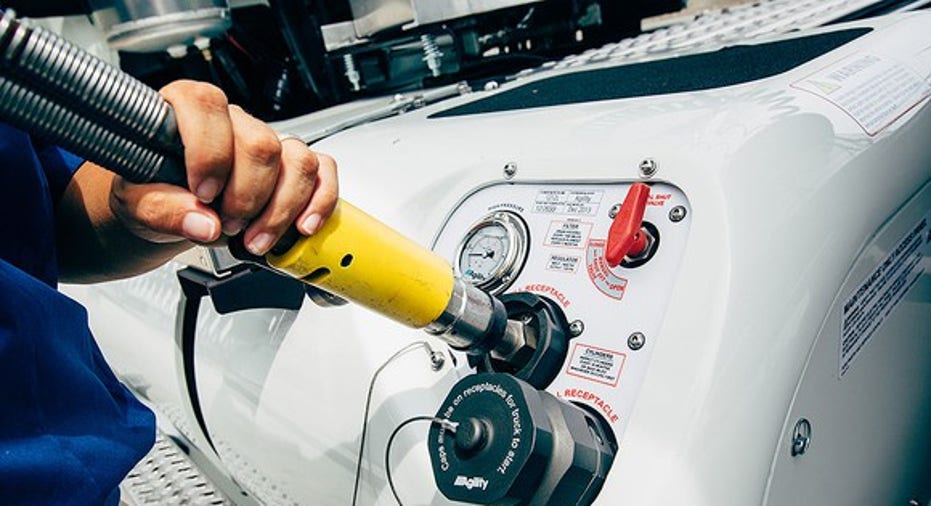Clean Energy Fuels' Deal With FedEx: Trucking Isn't Dead

Clean Energy Fuels has continued growing fuel volumes right through the downturn. That bodes well for the future. Image source: Clean Energy Fuels.
On Sept. 13,Clean Energy Fuels Corp(NASDAQ: CLNE) announced that it had been contracted by FedEx to build, service, and maintain a huge CNG refueling station for that company's freight subsidiary. But what does this deal -- which is pretty substantial -- really mean for Clean Energy Fuels?
In short, it's definitely a win, while also indicating that there's still significant opportunity within the over-the-road trucking market. Let's take a closer look at the implications.
What just happened
The station, which was designed and built and will be maintained by Clean Energy Fuels, will deliver some 2.5 million gallon-equivalents of natural gas per year to more than 100 CNG-powered class 8 tractors. The station has the capacity to refuel up to 22 vehicles simultaneously, four via "fast-fill" for quick refueling similar in speed to diesel or LNG, and 18 "time-fill" connections for overnight refueling.
The station is located in Oklahoma City, Oklahoma, one of the largest natural gas-producing states, which also boasts some of the lowest natural gas prices in the nation. This likely played a big role in FedEx's decision to convert a portion of its freight fleet to natural gas.
What it means for Clean Energy Fuels
Over-the-road trucking is still a big opportunity, and adoption -- though slow -- continues to happen.Clean Energy has continued to grow its customer base and the number of vehicles it refuels, even as oil prices have stayed low,but the vast majority of Clean Energy's fuel volume sales growth over the past two years hasn't come from trucking. The biggest and fastest growing segments have been refuse, public transit, and other "return to base" vehicle fleet operators, while trucking has been relatively slow to move to natural gas.
Yet Class 8 trucking remains the holy grail. That segment of the transportation market consumes nearly five times more fuel than transit buses, airport vehicles, and refuse trucks combined, so even a slow and steady amount of adoption there would net potentially huge growth for Clean Energy Fuels. Furthermore, the company already has some 200 stations open today that are capable of refueling heavy trucks. In other words, there's a lot of potential growth already baked into the company's existing asset base.
Clean Energy may have turned a corner
Clean Energy Fuels has managed to continue growing its fuel volume sales right through the oil downturn and has reported profits the first two quarters of 2016. The company also reached a significant milestone in the second quarter when it retired $150 million in long-term debt that was due in August, while also maintaining a sizable cash cushion.
The company is heading into the second half of 2016 with strong momentum, and this deal is another indicator that demand for natural gas continues to remain strong, even in a cheap oil environment. If it can produce these kinds of results with oil prices so far down, the sky could be the limit when oil prices increase, fleet operators start paying a lot more for diesel, and natural gas starts becoming even more compelling than it already is today.
A secret billion-dollar stock opportunity The world's biggest tech company forgot to show you something, but a few Wall Street analysts and the Fool didn't miss a beat: There's a small company that's powering their brand-new gadgets and the coming revolution in technology. And we think its stock price has nearly unlimited room to run for early in-the-know investors! To be one of them, just click here.
Jason Hall owns shares of Clean Energy Fuels. Jason Hall has the following options: long January 2017 $5 calls on Clean Energy Fuels and long January 2017 $3 calls on Clean Energy Fuels. The Motley Fool owns shares of and recommends Clean Energy Fuels and FDX. Try any of our Foolish newsletter services free for 30 days. We Fools may not all hold the same opinions, but we all believe that considering a diverse range of insights makes us better investors. The Motley Fool has a disclosure policy.



















